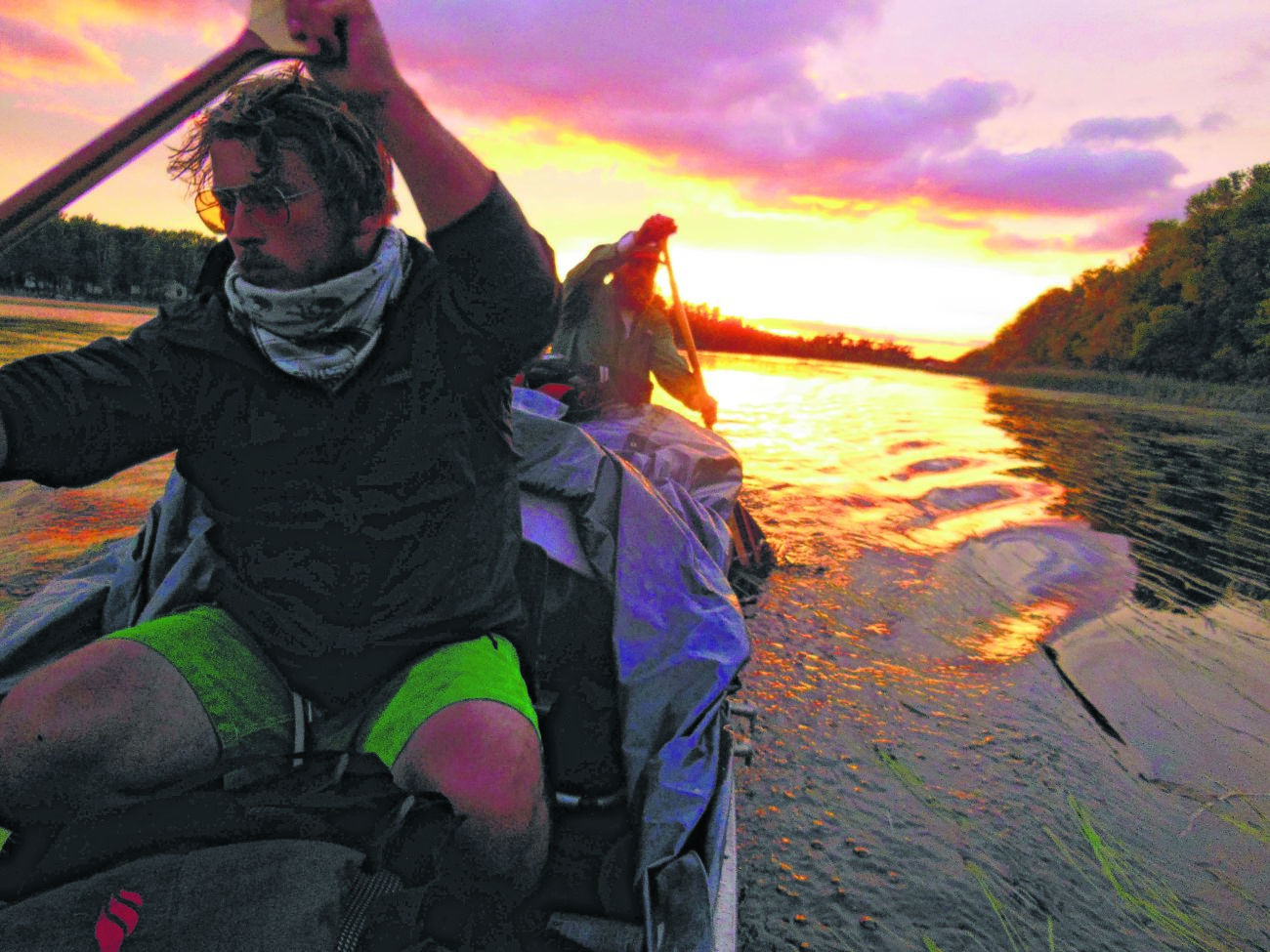
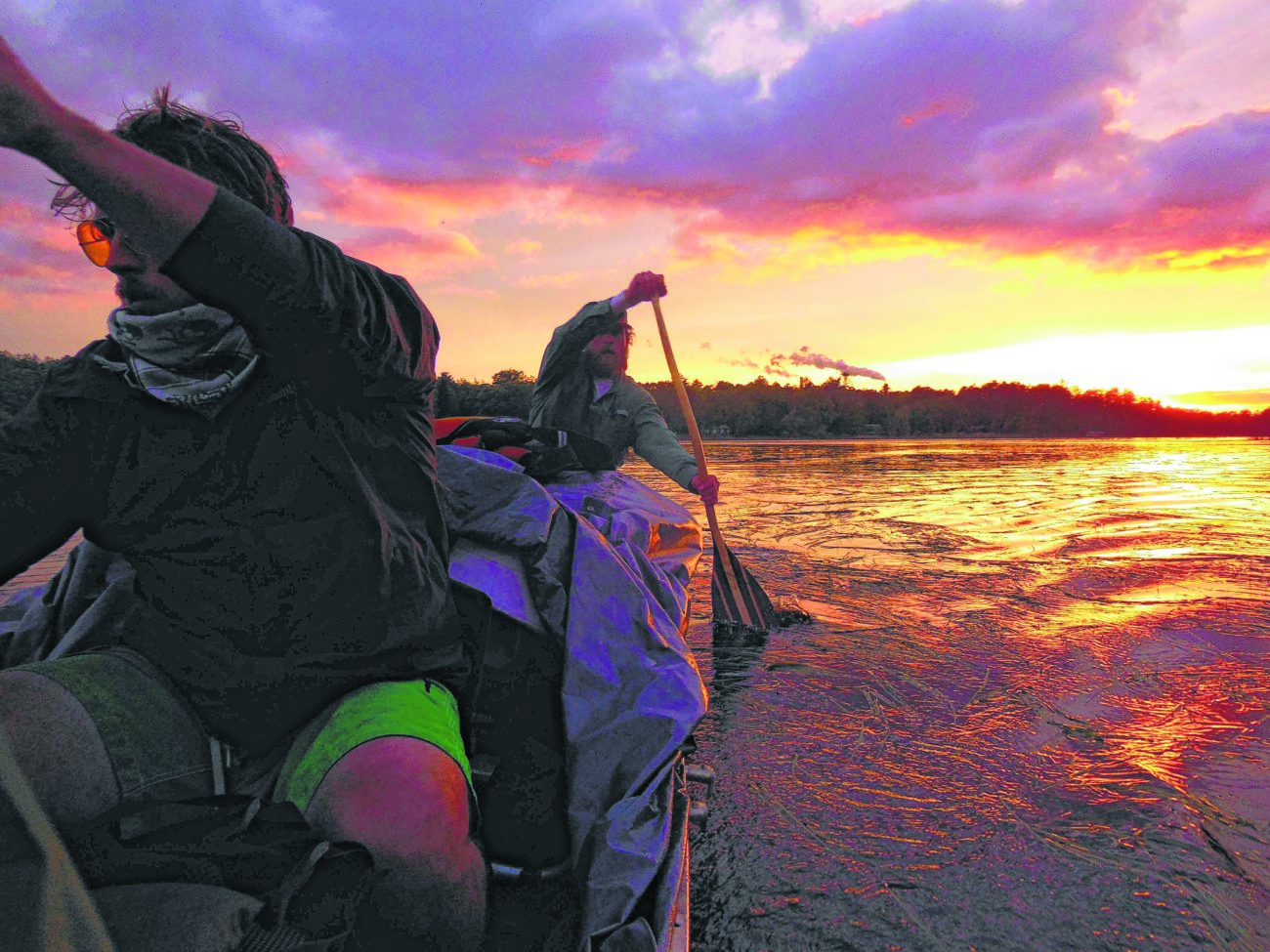
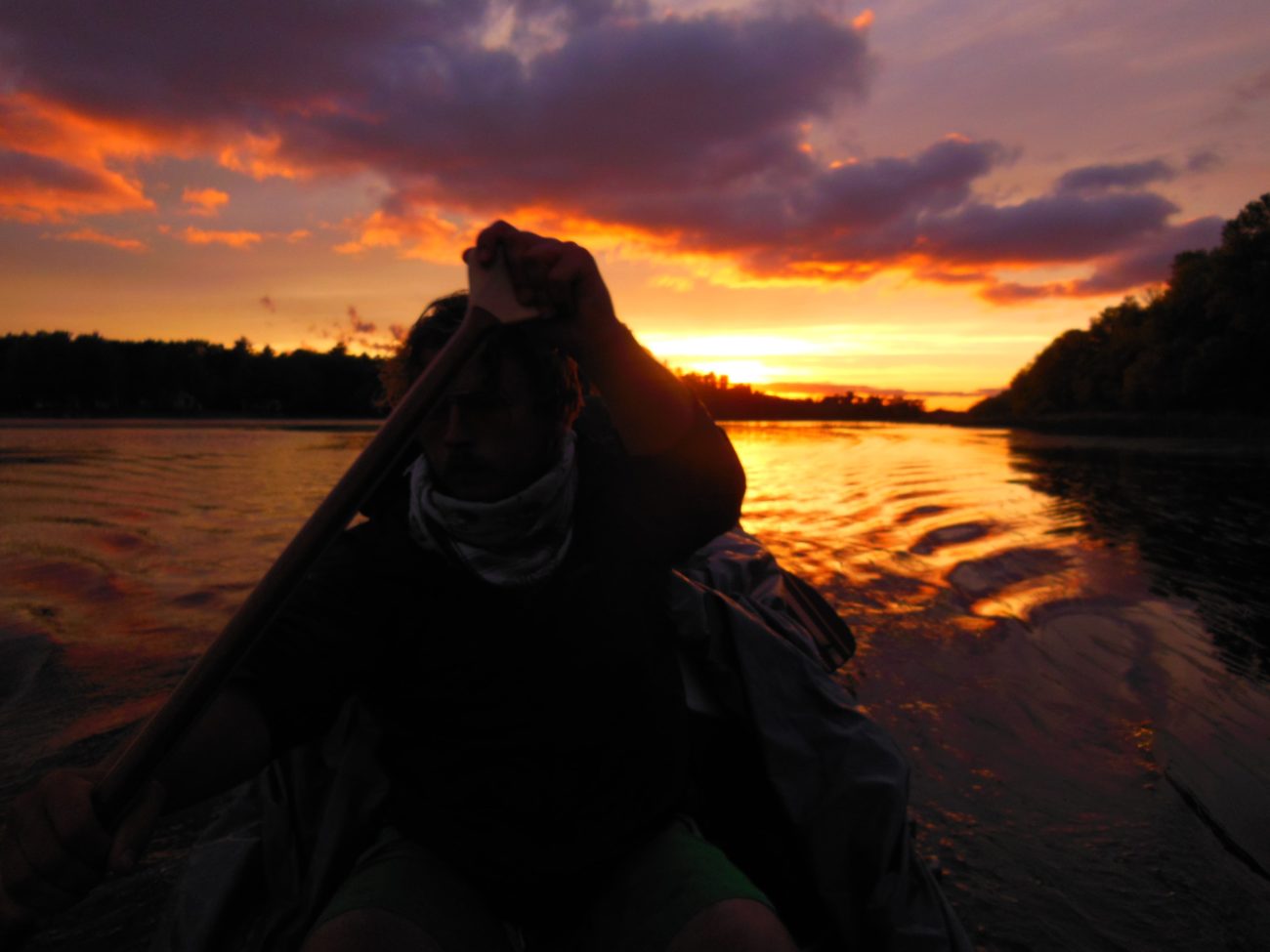
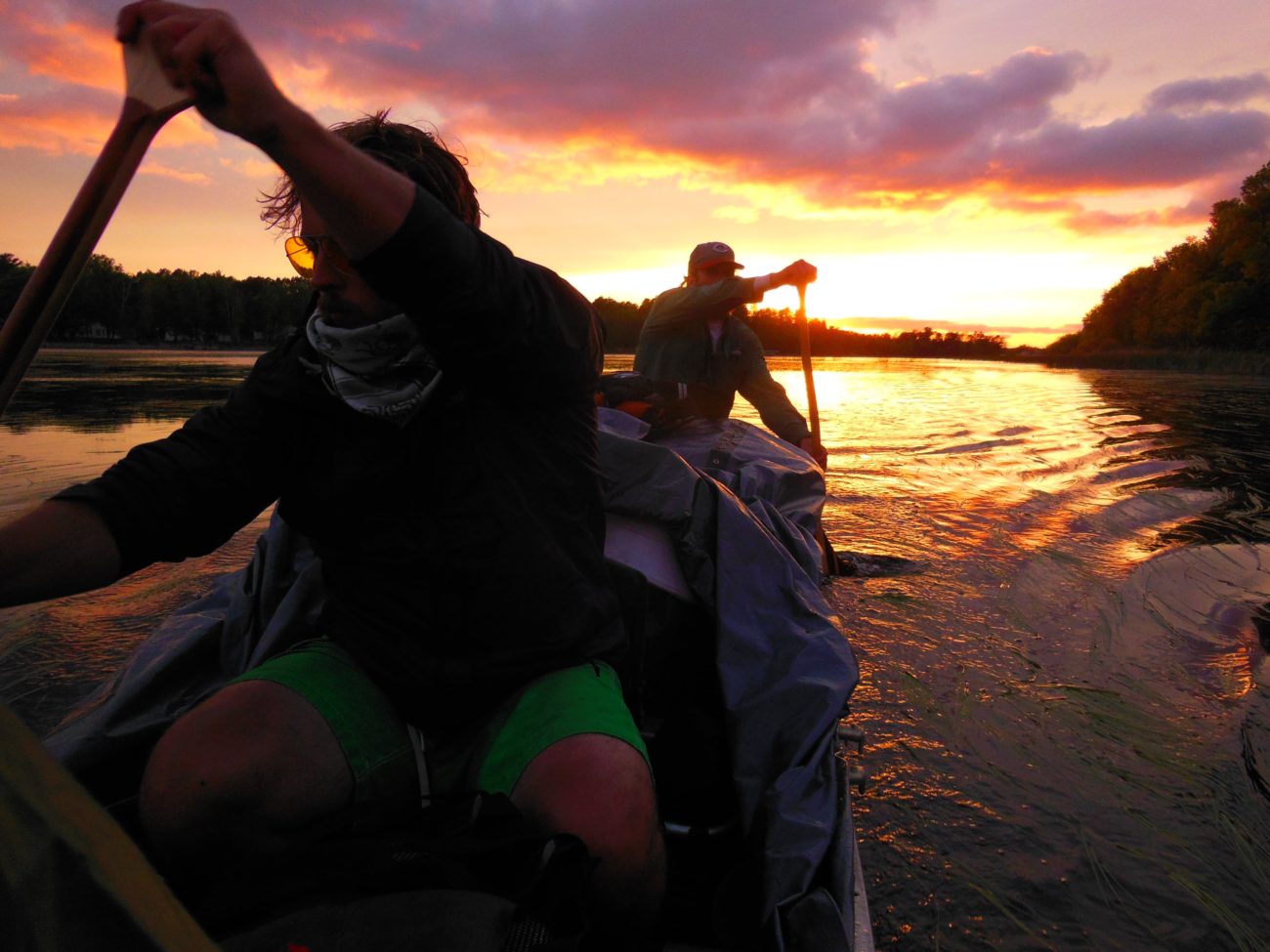
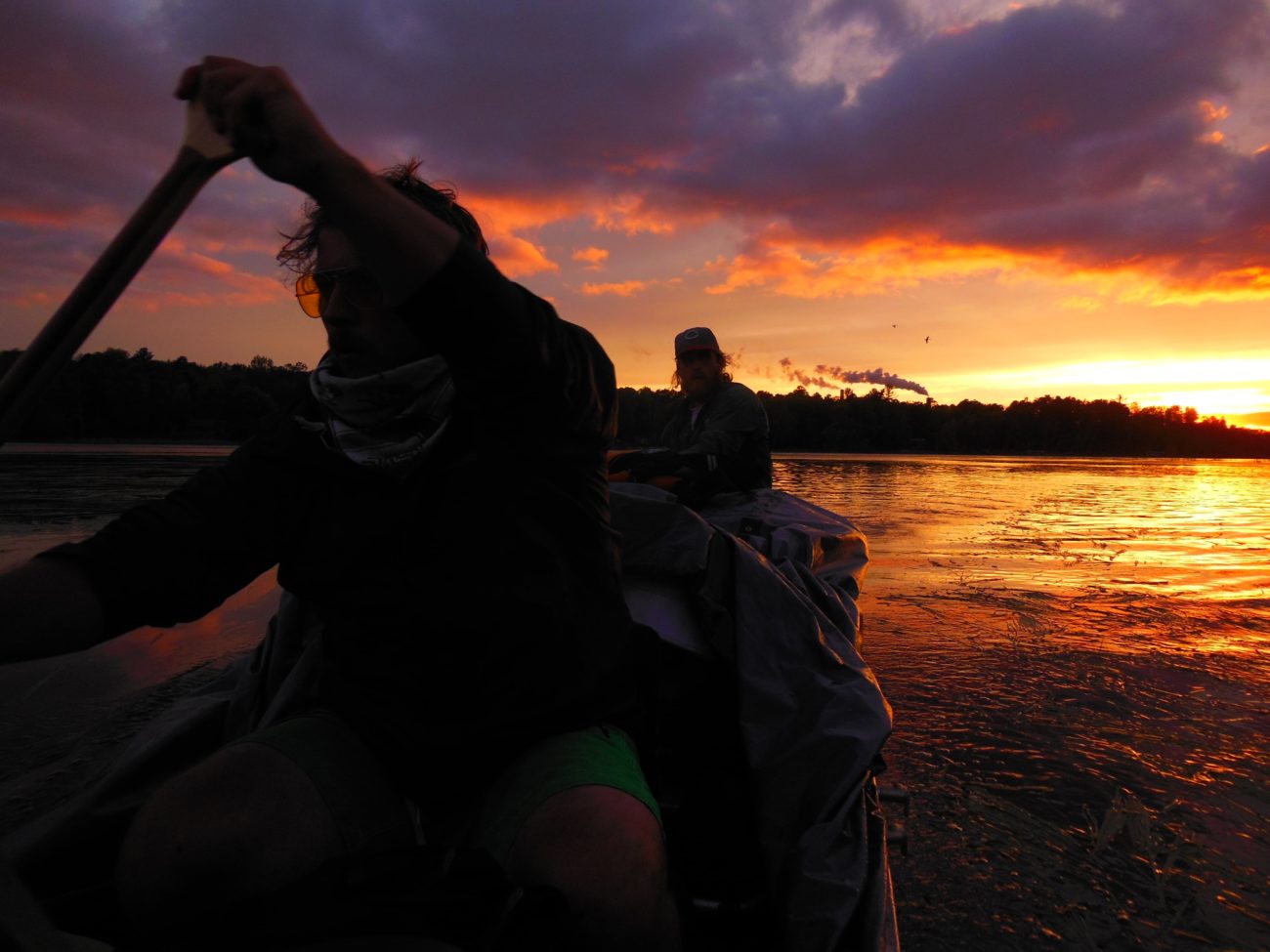

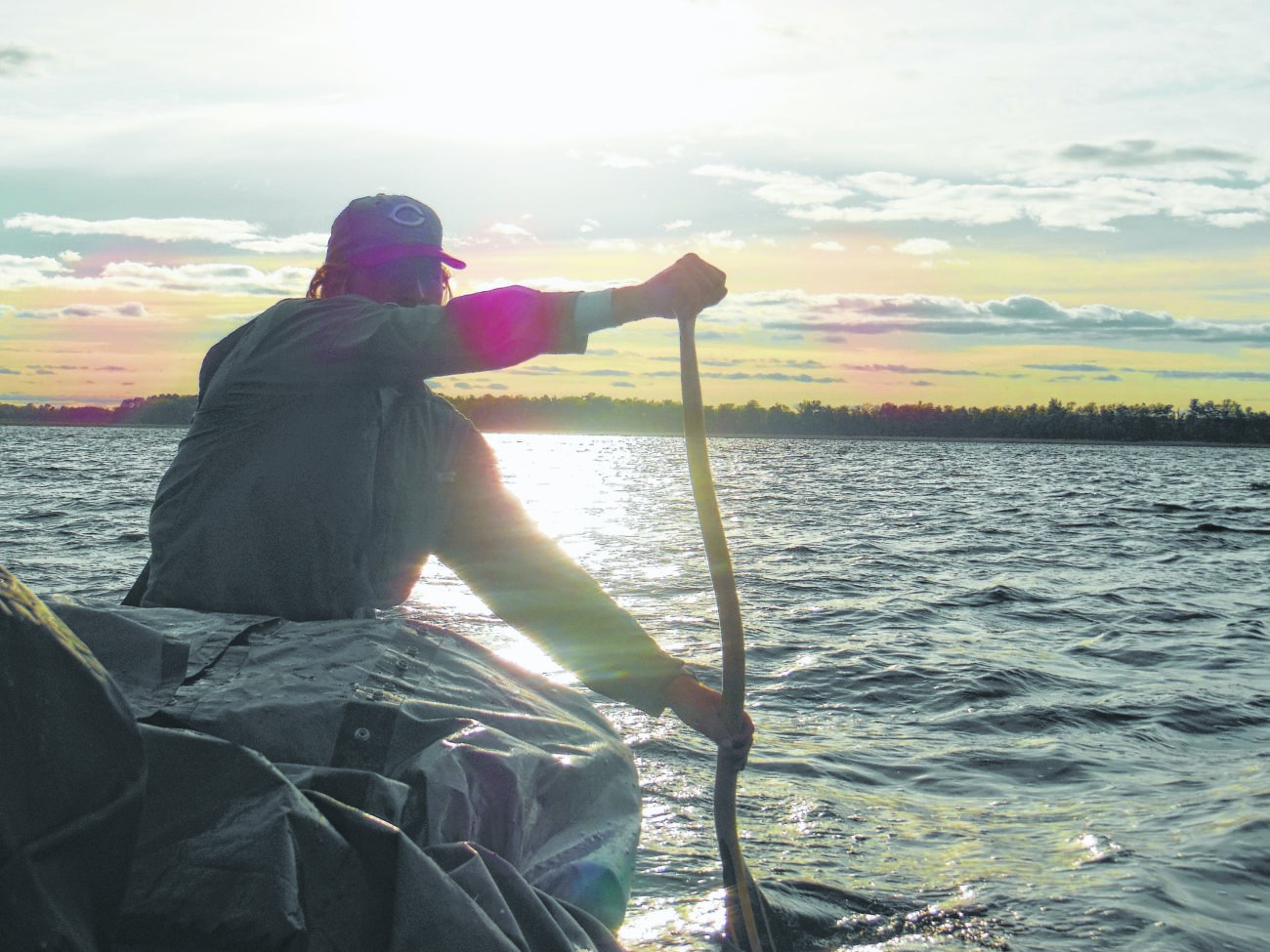

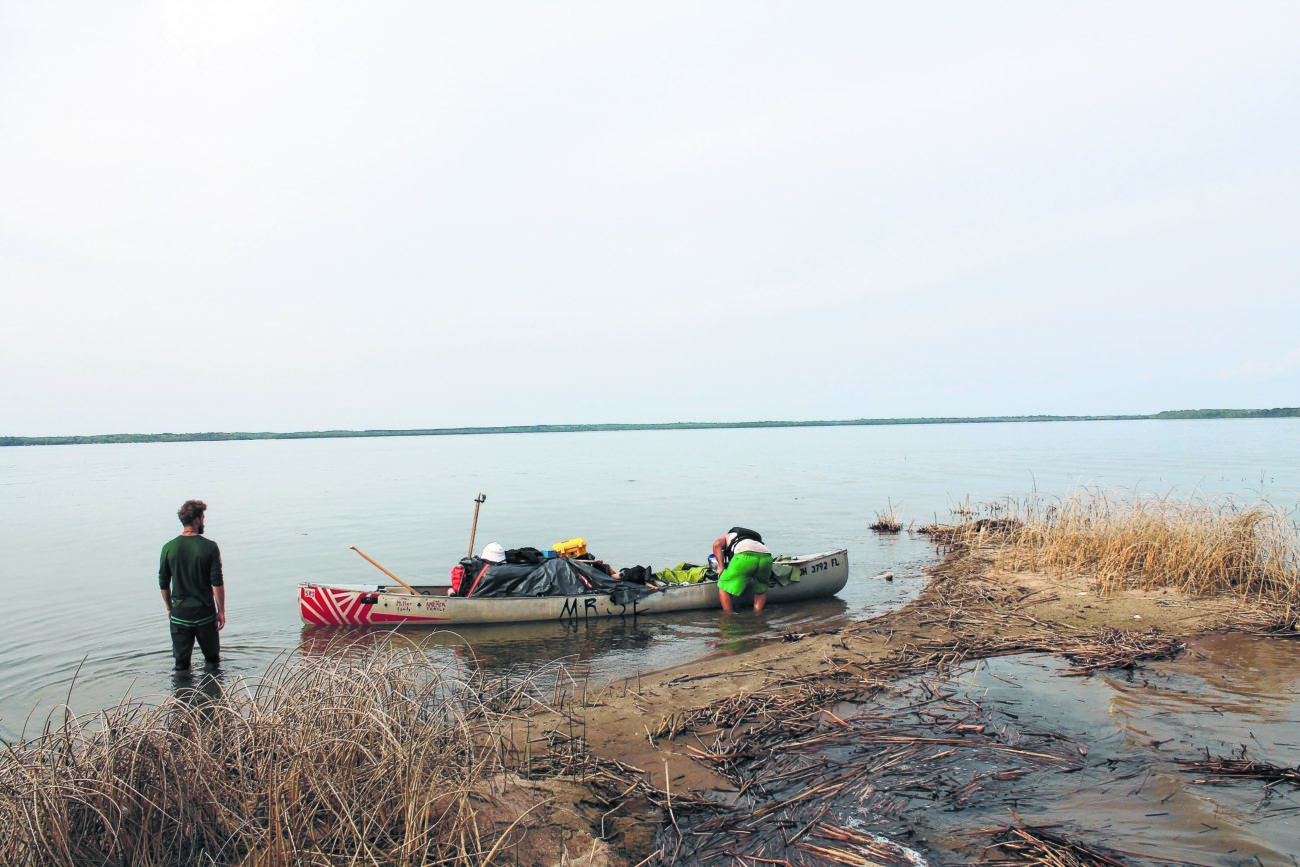
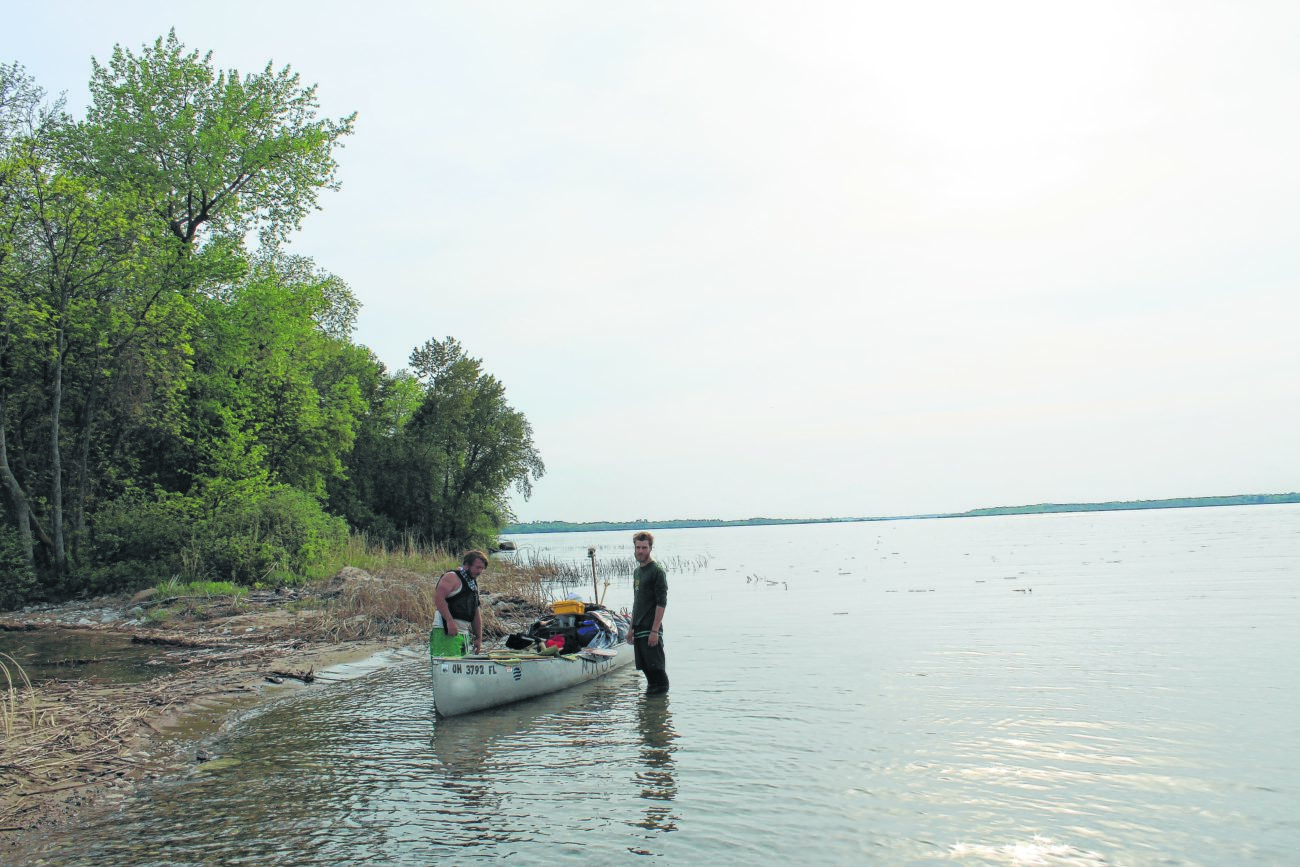
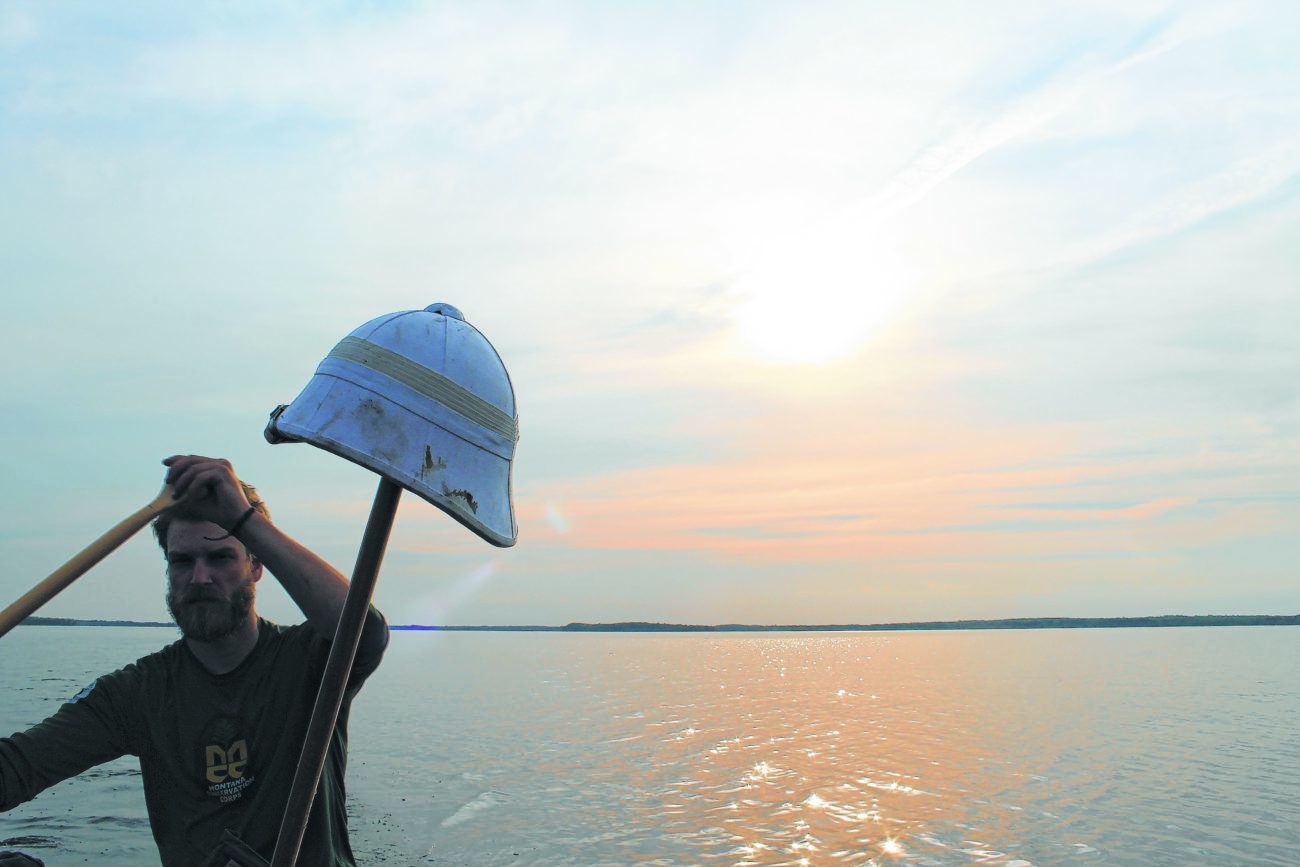
By Melanie Speicher
GRAND RAPIDS, Minn. — Three adventurers traveling the Mississippi River by canoe received a culture shock as they left the pristine waters of northern Minnesota and returned civilization.
Forrest Schoessow, 25, of Sidney, Shea Selsor, 25, of Piqua, and Alex Ross, 26, of Sidney, began their adventure on May 20. On Friday, they paddled into Grand Rapids, Minnesota, where they were greeted by black water.
“It was in the 30s here last night (Saturday),” said Schoessow, during his weekly update Sunday morning. “We’ve traveled 200 total miles since we left. It’s been very slow going because there are so many dams there and they don’t let the water flow.”
Schoessow, who celebrated his 25th birthday Saturday, said they’ve had to unload the canoes each time they reach a dam.
“Except when we got into Grand Rapids,” said Schoessow. “The power companies build the dams. When we got to Grand Rapids, the power company employees picked us up and all our equipment and showed us around town.”
Schoessow said after they arrived in Grand Rapids, Minnesota, (not to confused with Grand Rapids, Michigan) the three began sending out postcards to their supporters back home and updated their website with travel adventures.
“We’ve covered some interesting terrain,” said Schoessow. “We’ve crossed a lot of lakes. We’ll now be seeing a drop in elevation after we leave Grand Rapids.”
Ross said it’s been a fantastic week on the river.
“But we’re all worn out,” said Ross. “Friday was our personal best day of paddling. There was no current but we were still able to go 34 miles.
“The trip has been as physical as I figured,” said Ross. “It’s been difficult but then we build up off a peak. The days off are definitely necessary.”
“It’s been a good week,” said Selsor.
When they departed Bemidji, Minnesota, on Monday, May 25, the trio began leaving state parks and Indian reservations and transitioned back into civilization.
“It’s been difficult to leave the pristine conditions behind,” said Schoessow. “As we were paddling down the river we could see a coal power plant. As we got closer to the plant, the water turned black.
“It was a slap in the face to realize what is happening to the river,” said Schoessow. “We were seeing beautiful creatures who were living in crystal clear waters. After the dam (at Grand Rapids), the water quality should improve.”
Schoessow said the construction of dams has caused problems for the Mississippi River’s eco system.
“They have caused one of the most radically changes to the eco system,” said Schoessow.
While the dams help provide energy and electric for American citizens, it also causes problems in the river.
“The dams contribute to the sedimentation of the river,” said Schoessow. “The loose soil builds up around the dam and it prevents creatures from living there. Plants also don’t grow there.”
Dams, he continued, provide a disconnected flood plan for the area.
“It changes the flow of the river and forces it to go in another direction,” said Schoessow. “It also causes erosion. The dams also trap pollution. The pools created by the dam trap pollution there. When the dams are open, the pollution flows downstream.”
Schoessow said at the beginning of the trip, they trusted the water quality and drank from the river. As the trip advanced, they saw changes in the river and see how pollution has changed the water quality.
The lake around the power plant, said Schoessow is appropriately named Blackwater Lake.
“Turn off the lights when you’re not in a room. If you’re phone is fully charged, unplug it. Don’t waste electricity,” said Schoessow of a way to help prevent black water.
“As we were paddling toward the giant power plant, which is an ominous feature, we saw the black water as we approached it,” said Selsor.
The river, he said, has changed from the maps they have to navigate it.
“The river has changed dramatically,” he said. “It meanders and changes direction. The maps are not accurate so it’s made navigation rater difficult.”
Schoessow said they didn’t have to obtain any types of permits to travel down the Mississippi River.
“This is your river,” he said. “This is my river. It’s our river. It’s public land. It’s the lifeline of America’s trade and commerce.”
Before arriving at Grand Rapids, the men camped out on Cass Lake, which is an Indian reservation.
“They did come to visit us while we were camping,” said Schoessow. “We woke up and there were people at our campsite. It wasn’t a black bear, but it was still startling.”
During one of their stops, said Selsor, they met up with canoe racers who used to be pro paddlers.
“They were very supportive to what we’re doing,” said Selsor. “They did show use some stroking techniques. It’s what I’ve been telling Forrest and Alex, but it’s nice hearing the same thing from someone else.”
Selsor said the group is “going with the flow” and are learning to paddle a little better together.
“The canoe has been handling very well,” said Selsor. “But we have way too much stuff. We’re trying to cut back on things so we can move a little quicker. We are realizing there are some things we don’t need.”
Schoessow said they have traveled through a lot of lakes and have only had one bad weather day so far.
“There’s been a lot of wind and there was a thunderstorm that rolled through but we were prepared for that,” said Schoessow. “We paddled against the wind all day long.”
One of the lakes they traveled was Winnibigoshish Lake,
“We used our makeshift sail that Forrest and Shea made in Sidney,” said Ross. “We used it on the biggest lake.”
“Crossing the lake was my biggest concern,” said Selsor. “It’s 15 miles wide and you can’t see across it. It was pretty daunting to be sitting in the middle of it in a canoe.
“But we had great weather for it,” he said. “The wind picked up and we made it across safely. That was a good feeling.”
Selsor said they experience 3 to 4 foot waves when they were crossing the lake.
“The canoe crewed well,” said Selsor. “That gave us more confidence for the day when we have to stay away from the barges. We’re becoming more comfortable on the board. We know this is our lifestyle for the next couple of months.”
The trio also met up with their friend, Caleb, and his goose, which he calls “Duck.”
“He had dry wood ready for us,” said Ross. “That was a welcome sight after a long day.”
The trio are recording what types of birds and animals they see on the trip. At the beginning, said Ross, they saw red wing black birds. Around the power plants they have seen yellow-headed black birds.
“We’ve also seen otters, which are sneaking but cute. We keep hoping one will come up to the canoe,” he said.
Minnesota, said Ross, is the longest state the trio will travel.
“We have another two days of travel to reach Minneapolis,” said Ross. With another day of travel after that, Ross said they should be leaving Minnesota and entering Wisconsin.
“Ideally we’ll be picking up our pace due to the current,” said Ross.
And on a personal note, “Hi Mom,” said Ross.
Schoessow said they have heard from their family and people they don’t know who are following their travels through the newspaper articles and their website.
And if Schoessow could give one piece of advice to those reading the articles, what would it be?
“Turn off your TV,” he said. “Put down the cellphone and go outside. Experience the outdoors of America. There’s so much to learn outside.”
“The trip is daunting and exciting,” said Selsor. “Each mile we travel is another mile toward our goal. We’re just going with the flow.”
And what a flow it is as the Mississippi River Survey Expedition travels down the Mississippi River to the Gulf of Mexico. They will travel 2,340 miles by the time the trip is complete.
Selsor said they have a lot more followers on their website and enjoy hearing from people along the way.
“The people we have met here have been curious about our communities as well,” said Schoessow. “A lot of people have never left the town where they live. They enjoy hearing stories about the Miami Valley, which gives us a touch of homesickness.”
Schoessow said they have shared the history of exploration out of the Dayton area with the people they have met in Minnesota.
“We are ambassadors for the Miami Valley,” said Schoessow.
The trip can be followed on their website, http://mrexpedition.squarespace.com and on Facebook, https://www.facebook.com/m.r.s.expedition. The Sidney Daily News has also linked up with the expedition’s Facebook account on its site, https://www.facebook.com/SidneyDailyNews.












